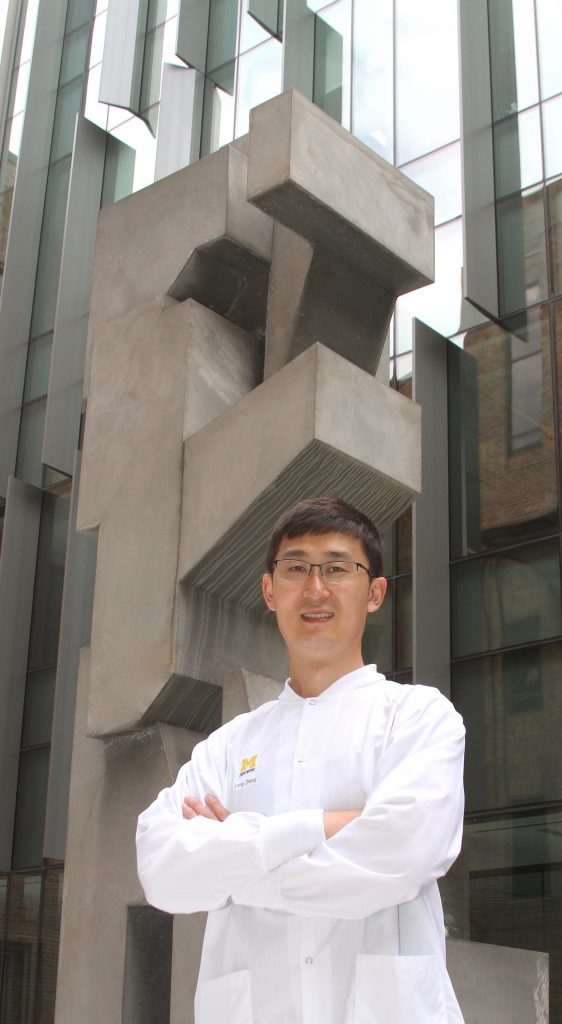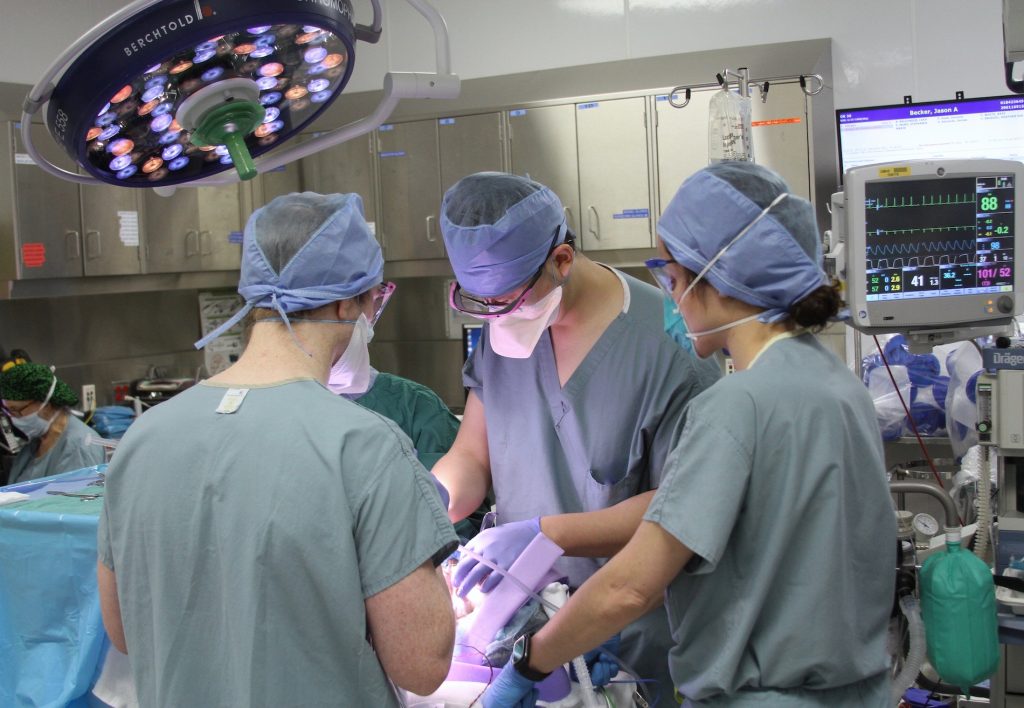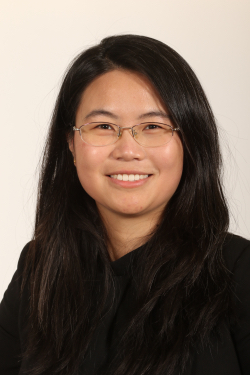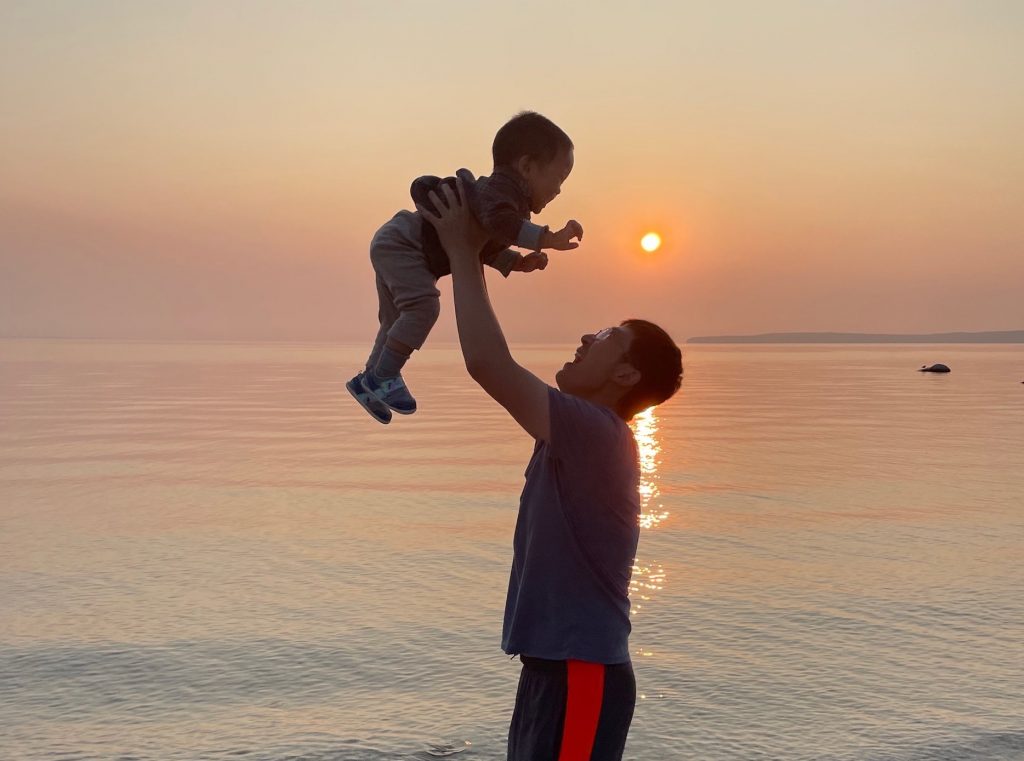Student Profile: Long Zhang’s ongoing education a mix of medicine, research, dentistry9 min read
This profile is one in a series highlighting School of Dentistry alumni, donors and students.
Ann Arbor, Mich., Sept. 7, 2021 – Long Zhang’s impressive journey into higher education began with simple advice from his mother when he was a child growing up in a small village outside of Beijing, China.
His parents were from a farm background, but his mother eventually became an accountant and his father was employed as a construction worker before being injured in a car accident. “My mother always encouraged me to do well in the school,” Zhang said. “I felt that education was my best chance to change my life, so I always tried to do well in school.”

He has succeeded in that goal and he’s not done yet. Now a fourth-year student at the University of Michigan School of Dentistry, Zhang earned two degrees and completed many additional programs on a non-traditional path to dental school. His academic resume starts with a medical degree – Bachelor of Medicine in Preventive Medicine – from Peking University. He followed that with a Master of Health Science in Epidemiology from the Bloomberg School of Public Health at Johns Hopkins University in Baltimore, Maryland.
Zhang’s research with faculty members at Peking University and Johns Hopkins has given him a broad base of education in the health sciences, public health, preventative medicine and epidemiology. As a research assistant, often in data analysis, he was part of a wide variety of studies, including the effect of different types of delivery on mother-to-child transmission of Hepatitis B; various health factors for men living with HIV; AIDS drug resistance; the correlation of depression and lack of sleep for pregnant women; neighborhood factors in childhood obesity; how housing affects early childhood development in sub-Saharan Africa; and medical interventions for acanthamoeba keratitis, a rare but serious eye infection.
Zhang’s interest in working in a healthcare field stems from a health issue he experienced as a teenager. Vertigo and a loss of balance caused him to miss school for three months. Despite seeing numerous doctors, the cause was never diagnosed and the condition eventually went away on its own. “I went to a lot of hospitals and met with physicians. I felt they were really nice even if they couldn’t figure out the reason,” Zhang said. “Through that experience I learned that medicine is really fantastic because the doctors have the knowledge and skills. I felt that was probably the field I wanted to do.”
He did well on the college entry exam that is part of the Chinese education system, but he was not accepted to his first choice of clinical medicine. However, he still gained admission to the prestigious Peking University for his second choice of preventive medicine, which focuses on research rather than practicing medicine. For four years he took the same courses as the medical students, but his fifth year shifted to research in public health, with topics such as epidemiology and methodology, biostatistics, maternal and child health, infectious disease and cancer. He enjoyed researching the various public health issues and was glad he chose the field.
One of his professors at Peking University had studied in the United States and encouraged Zhang to continue his education here. Zhang and his then-girlfriend and now wife, Yanjie Huang, were accepted to the master’s program at Johns Hopkins. While earning his master’s degree from 2012 to 2014, Zhang was a research assistant and teaching assistant. After earning his master’s degree, Zhang stayed at Johns Hopkins as a biostatistician for four years, working in the Department of Epidemiology with investigators in various fields, including the school’s major HIV research center that has been conducting longitudinal studies for more than 30 years.

During his time at Johns Hopkins, Zhang began refining his career plans, debating staying in a primarily medical field or moving to dentistry. He shadowed a general dentist in the Baltimore area and liked what he discovered. “You have your own office and all your own people. I feel it is a very relaxing environment. I think that it is a good fit for me because I want to have a balance between my career and my family, so that’s why I decided to pursue dentistry. And also, I heard that some dental schools, like Michigan, have the opportunity to also do research, which was a good opportunity because of my research background.”
To prepare for the move to dentistry, Zhang took a year of pre-dental coursework at nearby Towson University while he worked at Johns Hopkins. He applied to about a dozen dental schools and chose U-M because of its dual excellence in clinical dentistry and research opportunities.
Since arriving at the dental school in 2018, Zhang has picked up on his research interests quickly, providing support for a major research project on childhood caries being led by Dr. Margherita Fontana. He’s narrowed his dentistry practice interests to oral and maxillofacial surgery (OMFS), volunteering to observe and assist in that department more often than is the class requirement so that he can more rapidly advance his skills in that area.
Zhang also has been impressed by his classmates, most of whom are nearly 10 years younger. “Especially during the first two years, we spent a lot of time in the pre-clinic and I felt like I made a lot of good friends. No matter in class or out of class, we always hung out together. I learned a lot of things from them. I’m a little older, but they are really talented, and even though they are younger they have a lot of good experience and I learn from them.”
Overall, dental school at U-M has been what he had hoped for. “Before I came here, I felt dentistry was a really good fit for me. When I started, I really enjoyed the journey. Everything I learned, I feel is really good. It gives me a good foundation for patient care. I think the most important thing is that the teaching and the environment – the faculty and the students – are very encouraging. I think that is the most important for me. The faculty understand that we are starting to develop the clinical skills, so they are very supportive and slowly explain everything and teach us to do the procedure. I am glad we have good faculty here.”

The upcoming challenge for Zhang after he graduates with his DDS next spring is where his educational journey will continue. He is applying to OMFS residencies around the country, but the relatively few available positions make it highly competitive and uncertain where he might need to move next. That decision has become more complicated in the last year and a half because of two developments. First, his wife, Yanjie, gave birth to their son, Kai, in March 2020. Having a baby at the start of the COVID-19 pandemic was a major challenge for a parent in dental school and still is. Then their lives changed significantly again this summer when Yanjie started her first year at the dental school. She originally planned to join the class that started in 2020, but the couple needed to postpone her entrance for a year because of circumstances related to the pandemic. That means she will still have three years left in dental school when Long graduates next spring.
The couple have lived apart before. When Long first started dental school at U-M, Yanjie was still at Johns Hopkins, where she worked as a data analyst and research associate after earning her master’s degree. They maintained a commuter marriage for the first couple of years of Long’s dental school before Yanjie moved to Ann Arbor. Now they are facing a similar situation if Long takes a residency at a distant university or medical center. He’s hoping to find options as close as Detroit or Chicago. Fortunately, he says, Yanjie’s parents from China have come to Ann Arbor to help with caring for Kai for now. Despite all the challenges, Zhang enjoys his spare time with his wife and son, and attributes his motivation and energy to his loving family.
Though the future only a few months away remains uncertain, Zhang says he is happy with the decisions he has made in his educational journey thus far, and he is looking forward to the opportunities a career in dentistry will afford. He believes his background in research combined with his dental degree will be rewarding. “As a clinician, you will probably wonder whether some procedures will work compared to others. When you have a question, that’s the opportunity to do the research. I have the training, I know the process. I think that really gives me an advantage to improve patient care. And that’s the ultimate goal – to provide the best care for the patient.”

###
The University of Michigan School of Dentistry is one of the nation’s leading dental schools engaged in oral health care education, research, patient care and community service. General dental care clinics and specialty clinics providing advanced treatment enable the school to offer dental services and programs to patients throughout Michigan. Classroom and clinic instruction prepare future dentists, dental specialists and dental hygienists for practice in private offices, hospitals, academia and public agencies. Research seeks to discover and apply new knowledge that can help patients worldwide. For more information about the School of Dentistry, visit us on the Web at: www.dent.umich.edu. Contact: Lynn Monson, associate director of communications, at [email protected], or (734) 615-1971.
